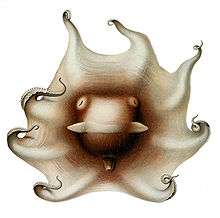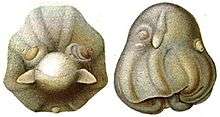Umbrella octopus
Umbrella octopuses (family Opisthoteuthidae) are a group of pelagic octopuses. Umbrella octopuses are characterized by a web of skin between the tentacles, causing them to somewhat resemble an opened umbrella when the tentacles are spread.
| Umbrella octopuses | |
|---|---|
 | |
| Opisthoteuthis californiana | |
| Scientific classification | |
| Kingdom: | Animalia |
| Phylum: | Mollusca |
| Class: | Cephalopoda |
| Order: | Octopoda |
| Suborder: | Cirrina |
| Family: | Opisthoteuthidae Verrill, 1896 |
| Genera | |


Description
Opisthoteuthidae are a group of octopuses characterized by a web of skin in between their tentacles. They have a U or W shaped shell that holds the mantle and connects to their tentacles at the bottom. This structure makes the umbrella octopus resemble an umbrella when they spread their tentacles/web out. The structure of the umbrella octopus has the oral surface below the mantle of the octopuses and the web with their tentacles surround the bottom of the mantle.[1] Their outer skin has a very delicate consistency that results in white spots appearing on their skin when damaged.[1] Opisthoteuthidae fall into the cirrate octopod group, meaning they have fins.[2] Although opisthoteuthidae are categorized as cirrates, unlike the other cirrates, they do not have an intermediate web; rather, they use the web in between their tentacles to mimic the intermediate web that other cirrates have.[1] Lacking an intermediate web is what causes the indentations in the outer edge of their tentacles that make them look like an umbrella.
Behavior
Defense mechanisms
Opisthoteuthidae lack an intermediate web but they mimic the defensive mechanism of ballooning by extending the web between their tentacles as much as possible and curving the outer edges of their arms inwards in order to have the edges touch the ground. They also extend their fins parallel to the floor to help keep their balance or they curve them around their mantle. Opisthoteuthidae have been observed to hold this position for five and a half minutes. Another defensive mechanism that Opisthoteuthidae have been observed using is web-inversion which is when they have their arms turned upwards and their web with the oral surface facing outwards. The oral surface can be facing the floor, or the octopuses may lie laterally so their side is in contact with the floor. It has been noted that these defensive behaviors are the positions the octopuses may go into while feeding as well, but it is possible that this could be because of the stress of being captured and placed in an aquarium to be observed.[1]
Resting behavior[1]
When resting at the floor, the octopus's behavior falls into one of two tactics: bottom-resting or flat-spreading. Bottom-resting is when the octopus is resting near the floor. It will erect its mantle, curve the outer edges of its tentacles inwards to have them be the only part making contact with the floor. The fins are extended out parallel to the bottom to maintain balance. When flat-spreading they spread their tentacles and web, so it is parallel to the bottom and they keep the edges of their tentacles curved inwards. Their heads will point backwards at a small angle and their fins will be used for stabilization.
Dispersion
Opisthoteuthidae are deep sea creatures that have been found in the Clipperton-Clarion Fracture Zone in the Pacific Ocean at a depth of about 4,800 m.[2] They have also been found in the South China Sea.[3] They stay within 3,000-4,000 meters below sea level and try to stay hovering over the ocean floor.
Taxonomy
- Genus Cryptoteuthis
- Cryptoteuthis brevibracchiata
- Genus Grimpoteuthis
- Grimpoteuthis abyssicola, red jellyhead
- Grimpoteuthis bathynectes, Dumbo octopus
- Grimpoteuthis challengeri
- Grimpoteuthis discoveryi
- Grimpoteuthis hippocrepium
- Grimpoteuthis innominata, small jellyhead
- Grimpoteuthis meangensis
- Grimpoteuthis megaptera
- Grimpoteuthis pacifica
- Grimpoteuthis plena
- Grimpoteuthis tuftsi
- Grimpoteuthis umbellata
- Grimpoteuthis wuelkeri – possibly same as G. umbellata or G. plena
- Genus Luteuthis
- Luteuthis dentatus, Lu's jellyhead
- Luteuthis shuishi
- Genus Opisthoteuthis[3]
- Opisthoteuthis agassizii Verrill, 1883
- Opisthoteuthis albatrossi (Sasaki, 1920)
- Opisthoteuthis borealis Collins, 2005
- Opisthoteuthis bruuni (Voss, 1982)
- Opisthoteuthis californiana Berry, 1949
- Opisthoteuthis calypso Villanueva, Collins, Sánchez & Voss, 2002
- Opisthoteuthis chathamensis O'Shea, 1999
- Opisthoteuthis depressa Ijima & Ikeda, 1895
- Opisthoteuthis dongshaensis C. C. Lu, 2010
- Opisthoteuthis extensa Thiele, 1915
- Opisthoteuthis grimaldii (Joubin, 1903)
- Opisthoteuthis hardyi Villanueva, Collins, Sánchez & Voss, 2002
- Opisthoteuthis japonica Taki, 1962
- Opisthoteuthis massyae (Grimpe, 1920)
- Opisthoteuthis medusoides Thiele, 1915
- Opisthoteuthis mero O'Shea, 1999
- Opisthoteuthis persephone Berry, 1918
- Opisthoteuthis philipii Oommen, 1976
- Opisthoteuthis pluto Berry, 1918
- Opisthoteuthis robsoni O'Shea, 1999
References
- Villanueva, Roger (June 2000). "Observations on the behaviour of the cirrate octopod Opisthoteuthis grimaldii (Cephalopoda)". Journal of the Marine Biological Association of the United Kingdom. 80 (3): 555–556. doi:10.1017/S0025315400002307. ISSN 1469-7769.
- Vecchione, Michael (2017). "Notes on cephalopods photographed near the bottom in the Clipperton-Clarion Fracture Zone". Marine Biodiversity. 47 (2): 307–310. doi:10.1007/s12526-016-0528-8.
- Lu, Chung-Cheng. "A new species of Opisthoteuthis, O. dongshaensis sp. nov., from the South China Sea (Octopoda: Cirrata: Opisthoteuthidae)." Zoological Studies 49.3 (2010): 405 420.